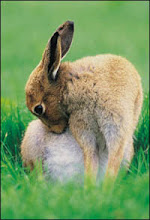At first glance, you'd think there's no way this can be non-fiction book. The author, a journalist, recounts seemingly mundane events in the life of an Afghan (apparently). The problem here is, one questions as to how the author manages to observe (or perhaps extract accounts) of various events, like people getting drunk, people bathing in the bathhouse etc. She is a western journalist after all, and it would seem strange how Afghans are willing to bare their soul to her.
Nevertheless, you will find all of this and more in The Bookseller of Kabul, a book I picked up because I needed a taste of those novels about how harsh life is in the middle east, how women are mistreated and so on and so forth. You'd find lots of these books in our shops nowadays, usually with a face of a women clad in burqa.
So in a sense this book presents nothing we already now of about life in the harsher corners of the M-E. But this account, as the author claims, is slightly different in that it follows a relatively well off middle-class family, the head of which is a bookseller (hence the title). To her credit, Asne Seirstad, the author, writes in such a way that even if we shrug in disbelief about events we are told to believe really happened, we nevertheless read on, convinced in some ways. I would say this book works more as a fictional account than a non-fiction one. If we proceed from the former assumption, this book becomes much more easier and indeed, entertaining to read.
This book focuses on a variety of characters, and shows how human each and every single one of them are. Seirstad also places emphasis on the place of women in Afghan society. Women, in Afghanistan, are repressed, abused, mistreated etc. etc. She quotes a poet, about how women can only express their feelings in "suicide and in song". And we don't doubt that. All women in backward Islamic countries don't fare too well, right?
Undoubtedly, this is one westerner observing another culture, and coming away shocked and critical. One cannot blame her; but rather than just telling us what the author thinks, perhaps more emphasis and thought should be placed on what Afghan women themselves think, without any interpretation or commentary on the author's part (which frequently happens). Regardless, a good book nonetheless, but I find it ironic that this book reads better as a fictional story than a true to life account.
Nevertheless, you will find all of this and more in The Bookseller of Kabul, a book I picked up because I needed a taste of those novels about how harsh life is in the middle east, how women are mistreated and so on and so forth. You'd find lots of these books in our shops nowadays, usually with a face of a women clad in burqa.
So in a sense this book presents nothing we already now of about life in the harsher corners of the M-E. But this account, as the author claims, is slightly different in that it follows a relatively well off middle-class family, the head of which is a bookseller (hence the title). To her credit, Asne Seirstad, the author, writes in such a way that even if we shrug in disbelief about events we are told to believe really happened, we nevertheless read on, convinced in some ways. I would say this book works more as a fictional account than a non-fiction one. If we proceed from the former assumption, this book becomes much more easier and indeed, entertaining to read.
This book focuses on a variety of characters, and shows how human each and every single one of them are. Seirstad also places emphasis on the place of women in Afghan society. Women, in Afghanistan, are repressed, abused, mistreated etc. etc. She quotes a poet, about how women can only express their feelings in "suicide and in song". And we don't doubt that. All women in backward Islamic countries don't fare too well, right?
Undoubtedly, this is one westerner observing another culture, and coming away shocked and critical. One cannot blame her; but rather than just telling us what the author thinks, perhaps more emphasis and thought should be placed on what Afghan women themselves think, without any interpretation or commentary on the author's part (which frequently happens). Regardless, a good book nonetheless, but I find it ironic that this book reads better as a fictional story than a true to life account.



No comments:
Post a Comment